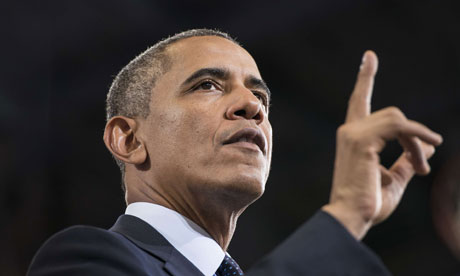
In the first of a series of speeches, the president defends the momentum of the middle class in order to divert attention from the other scandals of Washington.
With the aim of taking the reins of the U.S. political scene and redirecting the debate toward economic matters, the country’s president, Barack Obama, has defended the importance of putting a stop to social inequality and reinforcing the middle class. He attacked the Republicans in Congress for obstructing the recovery of the country. On Wednesday at Knox College in Galesburg, Ill., Obama gave the first of a series of speeches to span the next few months, with which the White House seeks to impose the president’s script concerning the scandals and controversy that have focused on Washington’s political state in the last months and have forced the administration to change its agenda.
Obama just announced new proposals, aware that the Republican majority’s persistent blockade in the House of Representatives has been stalling many of his economic initiatives in Congress. However, he defended the achievements of his first term and bet on continuing on that path. “This growing inequality isn’t just morally wrong; it’s bad economics,” the president said. “So good jobs, a better bargain for the middle class and the folks who are working to get into the middle class, an economy that grows from the middle out, not the top down — that’s where I will focus my energies. That’s where I will focus my energies not just for the next few months, but for the remainder of my presidency.”
The scandals that have surrounded the American government in the last months have obligated the president to deviate from the planned agenda for his second term, forcing the White House to be defensive and always one step behind events. These circumstances have dented the president’s popularity in the polls, which has reached the lowest approval levels since November 2011, according to the latest poll published yesterday by The Wall Street Journal. “With an endless parade of distractions, political posturing and phony scandals, Washington has taken its eye off the ball,” Obama stated. “Short-term thinking and stale debates are not what this moment requires. Our focus must be on the basic economic issues that the matter most to you — the people we represent,” added the president.
With this speech, Obama wished to resume the political initiative before two major political pulses, which are drawing nearer in the coming months: the debate about the federal budget for the new fiscal year, which begins in October, and the increase in debt ceiling, which expires in November. The president did not hide his frustration at the complete division between Republicans and Democrats in Congress and the inability to reach agreements. “I will not allow gridlock, inaction or willful indifference to get in our way. Whatever authority I have to help the middle class, I’ll use it. Where I can’t act on my own, I’ll pick up the phone and call CEOs and philanthropists and college presidents — anybody who can help — and enlist them in our efforts,” Obama ensured.
The White House doesn’t wish for these speeches to change the position in which the Republican Party has castled on the latest negotiations on deficit and debt — it is only willing to make concessions in exchange for spending cuts on social programs. Republican leader in the House of Representatives John Boehner didn’t even wait for Obama to finish his speech to show their aversion. “The American people aren’t asking, ‘Where are the speeches?’ They are asking, ‘Where are the jobs?’” he said.
The choice of Knox College to start the White House’s new strategy is full of symbolism. In 2005, when he had just been elected as senator in Illinois, Obama gave his first speech there regarding his vision for the economy. Then, he said that globalization had damaged the pillars on which the middle class perched and that the government should take responsibility for educating and providing the middle class with the necessary means to compete in a technological world. His speech then barely differed from the one yesterday, where he defended investment in education, infrastructure and renewable energy to create quality jobs.

Leave a Reply
You must be logged in to post a comment.